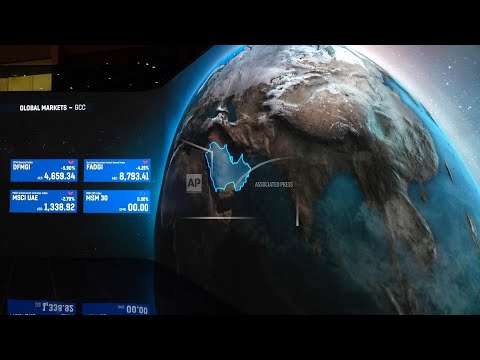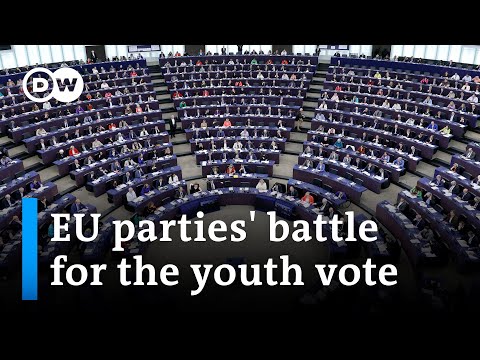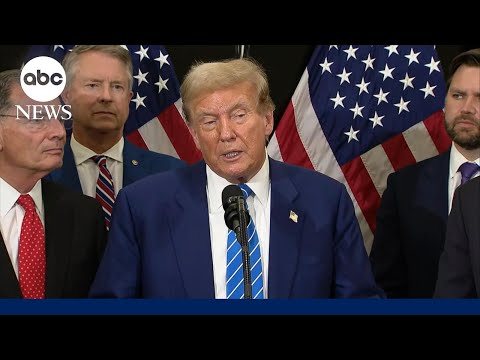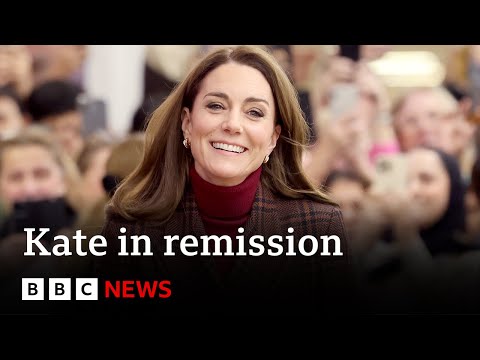(7 Apr 2025)
RESTRICTIONS SUMMARY:
ASSOCIATED PRESS
Dubai, United Arab Emirates – 7 April 2025
1. Screen showing GCC (Gulf Cooperation Council) market index
2. Wide of Dubai Financial market main stock room
3. Traders at the main stock room
4. Screen showing Dubai Financial Market General index in Red
5. Traders at the main stock room
6. Screen showing Real Estate Index
7. Wide of screen
8. Mid of Main stock room with screens
9. Close of screens
10. Various of traders at the Main Stock Room
11. Screen showing various indices fall
STORYLINE:
Middle East stock markets tumbled as they struggled with the dual hit of the new U.S. tariffs and a sharp decline in oil prices, squeezing energy-producing nations that rely on those sales to power their economies and government spending.
Benchmark Brent crude is down by nearly 15% over the last five days of trading, with a barrel of oil costing just over $63. That’s down nearly 30% from a year ago, when a barrel cost over $90.
That cost per barrel is far lower than the estimated break-even price for producers. That’s coupled with the new tariffs, which saw the Gulf Cooperation Council states of Bahrain, Kuwait, Oman, Qatar, Saudi Arabia and the United Arab Emirates hit with 10% tariffs. Other Mideast nations face higher tariffs, like Iraq at 39% and Syria at 41%.
“With these measures and the expected retaliatory measures that could be adopted by other countries, the stability and predictability of international trade could be undermined,” the accounting firm PwC said in an advisory to its Mideast clients.
The Dubai Financial Market exchange fell 5% as it opened for the week. The Abu Dhabi Securities Exchange fell 4%.
Markets that opened Sunday saw losses as well. Saudi Arabia’s Tadawul stock exchange fell over 6% in trading. The giant of the exchange, Saudi Arabia’s state-owned oil company Aramco, fell over 5% on its own, wiping away billions in market capitalization for the world’s sixth-most-valuable company.
The drop in Aramco, whose shares also power Crown Prince Mohammed bin Salman’s expansive plans to reshape the kingdom’s economy, ties directly back to the overall price of oil.
Last week, OPEC+ members Algeria, Iraq, Kazakhstan, Kuwait, Oman, Russia, Saudi Arabia and the UAE agreed to speed up the introduction of more oil into the market. This month marks the first oil production increase by the group since 2022.
“OPEC+ has shifted its market management strategy from a steady incremental increase in output to monthly announced targets, bringing forward higher output levels for May this year,” an analysis published Monday by the state-majority-owned Emirates NBD Bank of Dubai said.
“That will leave oil markets grasping with additional volatility as they assess the negative impact on global trade of the tariffs announced by the Trump administration.”
The Qatar Stock Exchange fell over 4% Sunday and a further 2% as trading resumed Monday. Boursa Kuwait fell over 5% on Sunday, with slight losses again Monday.
This comes as global markets are plunging following last week’s two-day meltdown on Wall Street, and U.S. President Donald Trump says he won’t back down on his sweeping new tariffs, which have roiled global trade.
AP Video by Bassam Hatoum
===========================================================
Clients are reminded to adhere to all listed restrictions and to check the terms of their licence agreements. For further assistance, please contact the AP Archive on: Tel +44(0)2074827482 Email: info@aparchive.com.
Find out more about AP Archive: http://www.aparchive.com/HowWeWork
Twitter: https://twitter.com/AP_Archive
Facebook: https://www.facebook.com/APArchives
Instagram: https://www.instagram.com/APNews/
You can license this story through AP Archive: http://www.aparchive.com/metadata/youtube/29109c9201a24f0da41caa6c50091df0
Author: AP Archive
Go to Source
News post in April 12, 2025, 12:04 pm.
Visit Our Sponsor’s:
News Post In – News





